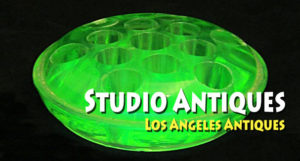 Uranium Glass? We all know about Depression Glass, right? Our grandmother’s had it. Depression glass is a clear or colored translucent glass that was given away free, or at a low cost, during the Great Depression (primarily the 1930’s). Call Studio Antiques now at 310-322 -3895 to see what is presently in the shop!
Uranium Glass? We all know about Depression Glass, right? Our grandmother’s had it. Depression glass is a clear or colored translucent glass that was given away free, or at a low cost, during the Great Depression (primarily the 1930’s). Call Studio Antiques now at 310-322 -3895 to see what is presently in the shop!
Movie theaters would give it away as a premium for coming to the pictures. Food companies, like Quaker Oats, might have placed it in a box of food as a gift for buying their item.
Common colors included pink, green and amber. Certain patterns are less common today and may sell for hundreds of dollars while other patterns are more prevalent and inexpensive to collect.
Sometimes while antiquing, you may come across a canary yellow or yellow-green colored depression glass. This glassware is likely Vaseline Glass. Vaseline glass’ name came about because it resembled the color of a petroleum jelly being sold at the time.
Vaseline glass was primarily made from the 1840’s up to the middle of WWII, with its heyday from the 1880’s to the 1920’s. (During WWII, the U.S. confiscated all uranium supplies, hence the cessation of manufacture. Production began again in 1958, but most production had ceased in 1970.) There is only one way to verify that the yellow glass you have is Vaseline glass. Vaseline glass will fluoresce under ultraviolet light (black light).
Often, people use the term Vaseline glass synonymously with Uranium. The truth is that Vaseline glass is uranium, but uranium is not necessarily Vaseline glass. Are you confused yet?
Uranium glass is an older term used to indicate glassware that was actually made with uranium oxide. The normal color of uranium ranges from yellow to green depending upon oxidation state of the glass. The use of uranium in the manufacture of glass dates as far back as 79AD, and has been found in glass tiles used in mosaic by the Romans. Here is an item we listed on eBay just this week. It is a uranium light shade. We have photographed it in natural and in ultraviolet light.
You can see how the green glass is really florescent under a black light. Although many, many types of pieces are made with uranium, and react to Geiger counters, uranium glass is considered relatively harmless and is only negligibly radio active. So, yes, you are safe.
Below is a great example of a lot we have available where, under normal light, the items look plain green with the same items under ultraviolet light.
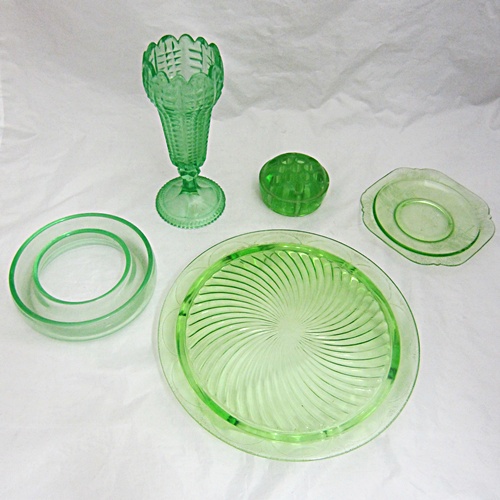
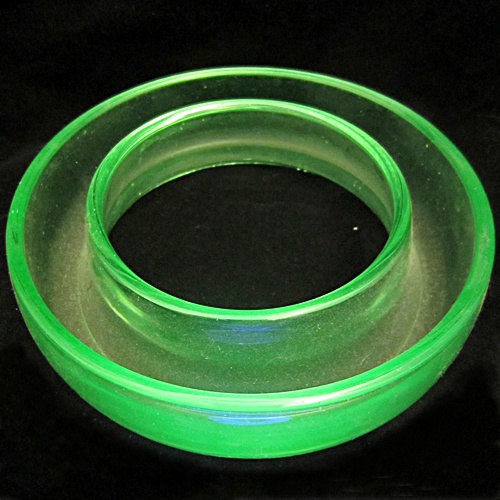
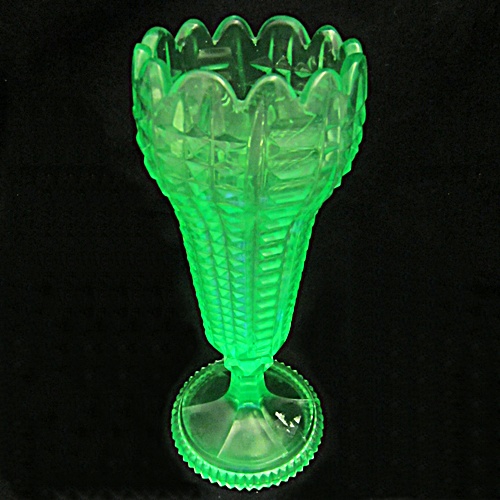
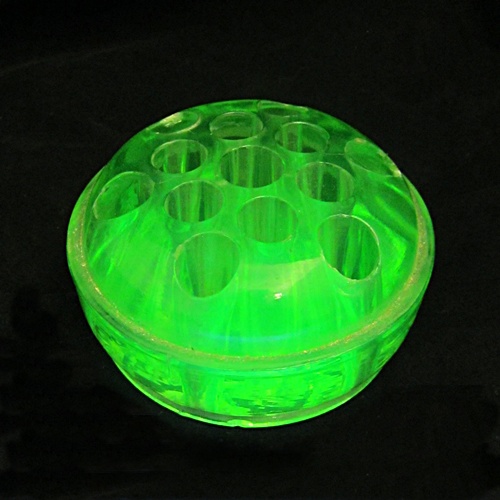
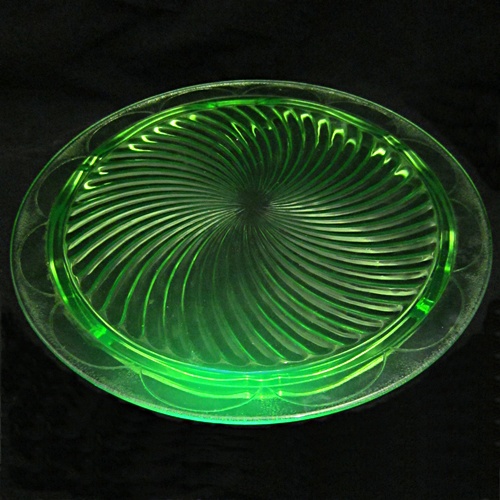 http://www.ebay.com/itm/Uranium-Vaseline-Glass-Five-Piece-Mixed-Lot-Cake-Plate-Flower-Frog-/360535074750?pt=LH_DefaultDomain_0&hash=item53f190a7be
http://www.ebay.com/itm/Uranium-Vaseline-Glass-Five-Piece-Mixed-Lot-Cake-Plate-Flower-Frog-/360535074750?pt=LH_DefaultDomain_0&hash=item53f190a7be
So, when you are shopping for antique or vintage glassware, keep your eyes peeled for that light yellow glass. You may want to pickup a small black light torch (flashlight) so that you can test your glass for florescence. They are inexpensive and worth the $5.00 or so you would be paying. Here is an example of a source: http://www.ebay.com/itm/Black-Mini-Aluminum-UV-ULTRA-VIOLET-9-LED-FLASHLIGHT-BLACKLIGHT-Torch-Light-Lamp-/181370698449?pt=US_Flashlights&hash=item2a3a893ad1
Uranium and Vaseline will cost you a bit more, but the color is worth the expense.
[wysija_form id=”1″]
Tags: black light, cake plate, Depression Glass, florescence, flower frog, petroleum jelly, posey holder, Radium Glass, ultraviolet light, uranium, uranium dioxide, Uranium Glass, Vaseline Glass